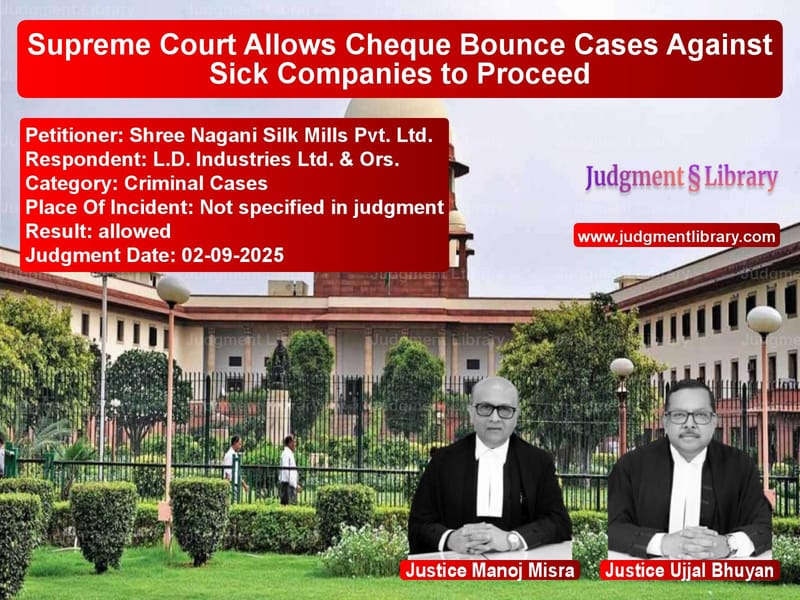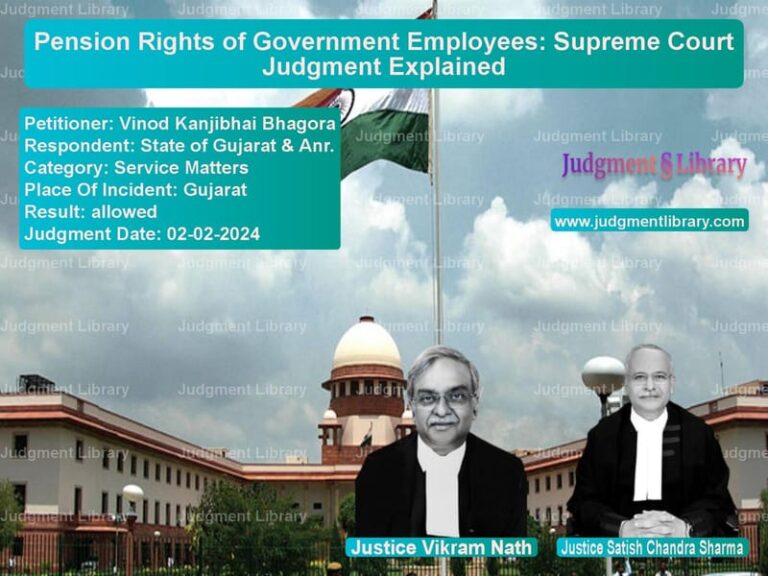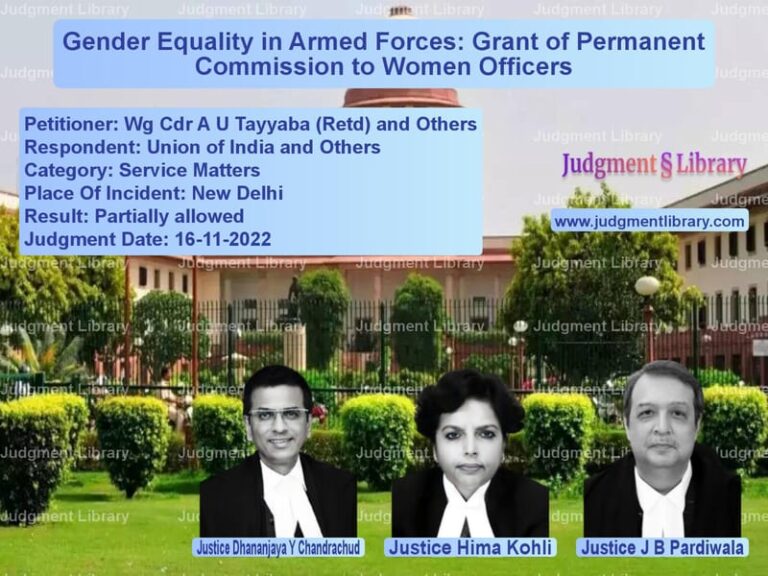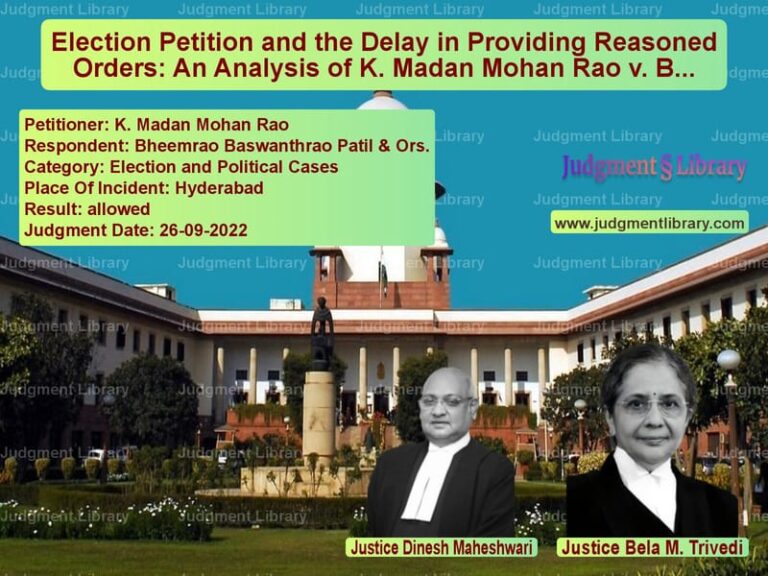Supreme Court Allows Cheque Bounce Cases Against Sick Companies to Proceed
In a landmark judgment that clarifies the legal position regarding cheque bounce cases against sick companies, the Supreme Court of India has ruled that proceedings under Section 138 of the Negotiable Instruments Act can continue even against companies declared sick by the Board for Industrial and Financial Reconstruction (BIFR). The judgment came in response to seven connected appeals involving Shree Nagani Silk Mills Pvt. Ltd. as the complainant and L.D. Industries Ltd. and its directors as the accused.
The Case Background
The dispute originated from multiple complaints filed by Shree Nagani Silk Mills Pvt. Ltd. against L.D. Industries Ltd. and its directors under Section 138 of the Negotiable Instruments Act. The complaints concerned several cheques issued in 2001, each for substantial amounts ranging from Rs. 1,61,646 to Rs. 20,00,000, which were dishonored due to insufficient funds in the drawer’s account.
The core allegation in all complaints was that the accused company had issued these cheques towards part payment for supplies made by the complainant. After the cheques were dishonored, the complainant served statutory notices on all accused parties calling upon them to pay the cheque amounts. When the payments were not made despite service of notices, criminal complaints were filed under Section 138 read with Section 141 of the Negotiable Instruments Act.
The Legal Challenge
The accused company raised a significant legal defense – they claimed that since the company had been declared ‘sick’ by BIFR under the Sick Industrial Companies (Special Provisions) Act, 1985 (SICA), and a restraint order had been passed preventing disposal of assets without BIFR’s consent, the proceedings under Section 138 of the Negotiable Instruments Act were not sustainable. They relied heavily on the Supreme Court’s decision in M/s. Kusum Ingots & Alloys Ltd. vs. M/s. Pennar Peterson Securities Ltd. to support their contention.
After the Magistrate dismissed their application to recall the processes, the accused approached the Sessions Court in revision. The revisional court allowed their revision petitions and discharged them from the offences. When the complainant approached the Bombay High Court through criminal writ petitions, the High Court dismissed them, leading to the present appeals before the Supreme Court.
The Appellant’s Arguments
Learned counsel for the appellant submitted that recall of processes is not permissible in view of law laid down by this Court in Adalat Prasad vs. Rooplal Jindal and Constitution Bench decision In Re: Expeditious Trial of Cases under Section 138 of NI Act, 1881. Therefore, the learned Magistrate was justified in rejecting the recall application. In such circumstances, the revisional court ought not to have interfered with the order of learned Magistrate. Thus, the High Court erred in not correcting the mistake committed by the revisional court.
The appellant’s counsel further argued that High Court misconstrued the law laid down by this Court in Kusum Ingots (supra) where, in paragraph 18, it was held that Section 22 of SICA does not create any legal impediment for instituting and proceeding with a criminal case on the allegations of an offence under Section 138 of the N.I. Act against a company or its Directors. Further, in paragraph 19 of the said judgment, it was clarified that where BIFR has issued a restraint order under Section 22A the Court would have to examine whether proceedings under Section 138 of N.I. Act can be instituted during the period in which the restraint order remains operative. Therefore, such issue would have to be decided on the facts of each case, that is, by taking into account the nature of the restraint order, the date when the cheque is issued and the reason for which it is issued.
The appellant emphasized that the restraint order issued by BIFR clearly provided that if the company was running, the current assets could be drawn to the extent required for day-to-day operations which meant that the embargo was not absolute and if cheques were issued for running day to day operations, the restraint order would not hit the proceedings under Section 138 of N.I. Act.
The Respondent’s Position
Per contra, learned counsel for the accused-respondent(s) supported the judgment of the High Court and submitted that the cheques sought to be encashed by the complainant were all post-dated and once the accused company was declared ‘SICK’ and a restraint order was passed, the complaint proceedings were liable to be quashed and, therefore, order of the revisional court as well as the High Court calls for no interference.
The Supreme Court’s Analysis
The Supreme Court, after careful consideration of the arguments and examination of the legal provisions, delivered a comprehensive judgment that clarified several important legal principles.
The Court first addressed the presumption regarding the date of cheques: “However, the law raises a presumption that every negotiable instrument bearing a date was made or drawn on such date. In such circumstances, to rebut the said presumption, evidence would have to be led. Therefore, at this stage, while dealing with validity of the processes issued, based on complaint allegations and affidavit filed in support thereof, in absence of any evidence led by the accused, it would not be permissible to pre-judge the issue and record a finding that cheque was post-dated.”
The Court examined the specific restraint order passed by BIFR dated August 21, 2000, which stated: “The company/promoters were directed u/s. 22-A of the Act not to dispose of any fixed or current assets of the company without the consent of the BIFR. In case the company was running, the current assets could be drawn to the extent required for day-to-day operations, proper account of which should be maintained.”
The Court noted that this restraint order would indicate that there was no embargo on drawing from the assets of the company to the extent required for day-to-day operations.
Clarification on Kusum Ingots Judgment
The Supreme Court provided crucial clarification on its earlier judgment in Kusum Ingots, which the lower courts had relied upon: “A careful reading of the aforesaid extracts from Kusum Ingots (supra) would make it clear that Section 22 of SICA does not create any legal impediment for instituting and proceeding with a criminal case on the allegations of an offence under Section 138 of the N.I. Act against a sick company or its Directors. However, where a direction is issued by BIFR, under Section 22A of SICA, restraining the company or its Directors not to dispose of any of its assets except with consent of the Board, whether a criminal complaint for the alleged offence under Section 138 N.I. Act can be instituted during the period in which the restraint order remains operative, is a plea which would have to be considered, and whether that plea is to be accepted or not will depend on the facts and circumstances of the case.”
The Court further elaborated on the legal principles: “Legal principles deducible from the decisions above, inter alia, are, (a) there is no embargo on filing a complaint under Section 138 of N.I. Act against a ‘SICK’ company; (b) even if there is a restraint order under Section 22A of SICA, the nature of the restraint order and the facts of that case would have to be considered before taking a decision whether the proceeding under Section 138 could continue or not; and, (c) the appropriate stage for taking such a decision would, ordinarily, be after parties have led their evidence.”
The Court’s Final Ruling
After comprehensive analysis, the Supreme Court concluded: “In the instant case, the restraint order under Section 22A of SICA did not restrain the accused-company to draw on its assets to meet its day-to-day operations and, according to the complaint allegations, the cheques in question were issued to discharge the liability of the accused-company against supplies made by the complainant company. In such circumstances, the revisional court fell in error by recalling the processes and discharging the accused at the threshold of the proceeding and the High Court erred in not correcting the error so committed by wrongly relying on Kusum Ingots & Alloys Ltd. (supra).”
The Court also emphasized the procedural aspect: “Besides above, the prayer to recall the processes was not maintainable in view of the decision of this Court in Adalat Prasad (supra), which has been affirmed by a Constitution Bench of this Court In Re: Expeditious Trial of Cases under Section 138 of NI Act, 1881 (supra).”
Significance of the Judgment
This judgment has significant implications for commercial transactions and cheque bounce cases in India. It establishes that the declaration of a company as ‘sick’ under SICA does not automatically provide immunity from prosecution under Section 138 of the Negotiable Instruments Act. The Court has clarified that each case must be examined based on its specific facts, particularly the nature of the BIFR restraint order and the purpose for which the cheques were issued.
The ruling ensures that companies cannot use their ‘sick’ status as a shield to avoid criminal liability for dishonored cheques, especially when those cheques were issued for day-to-day business operations. At the same time, the judgment maintains the protective intent of SICA by acknowledging that in appropriate cases, where the restraint order absolutely prevents any financial transactions, the courts may consider the specific circumstances.
The Supreme Court’s decision reinforces the sanctity of negotiable instruments in commercial transactions and ensures that the remedy under Section 138 of the Negotiable Instruments Act remains effective even against companies undergoing financial restructuring under SICA.
Petitioner Name: Shree Nagani Silk Mills Pvt. Ltd..Respondent Name: L.D. Industries Ltd. & Ors..Judgment By: Justice Manoj Misra, Justice Ujjal Bhuyan.Place Of Incident: Not specified in judgment.Judgment Date: 02-09-2025.Result: allowed.
Don’t miss out on the full details! Download the complete judgment in PDF format below and gain valuable insights instantly!
Download Judgment: shree-nagani-silk-mi-vs-l.d.-industries-ltd.-supreme-court-of-india-judgment-dated-02-09-2025.pdf
Directly Download Judgment: Directly download this Judgment
See all petitions in Fraud and Forgery
See all petitions in Cheque Dishonour Cases
See all petitions in Corporate Compliance
See all petitions in Debt Recovery
See all petitions in Judgment by Manoj Misra
See all petitions in Judgment by Ujjal Bhuyan
See all petitions in allowed
See all petitions in supreme court of India judgments September 2025
See all petitions in 2025 judgments
See all posts in Criminal Cases Category
See all allowed petitions in Criminal Cases Category
See all Dismissed petitions in Criminal Cases Category
See all partially allowed petitions in Criminal Cases Category







